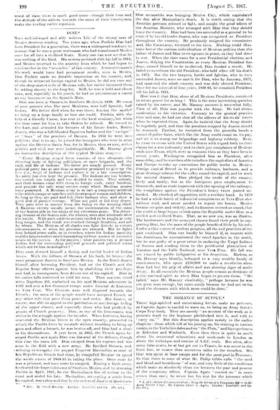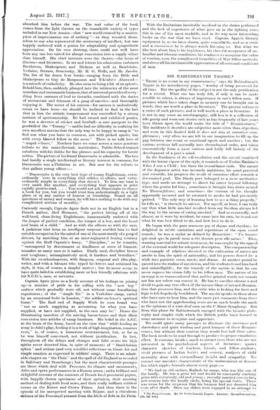THE ROMANCE OF SUPPLY.* Taste high-Oil-ilea and entertaining letters make
no pretence, as Captain Agate is careful to warn us, to being an Army Seeviee Corps 'rest-book. They are merely "an accotmt of the work as it presents itself to the beginner pitchforked into it, and told to carry on.' " But this description applies mainly to the earlier chapters—those which tell of his joining up, Ida training in various camps, in the Yorkshire dales and on " the Plain," and his experiences, at Aldershot and Woolwich. Es-en then there is quite as much about his occasional relaxations and week-ends in London as about the technique and routine of A.S.C. work. But when, after many false starts, he at last got out to Franco, lie was never in the front line, or nearer than eeventeen miles to the trenches. Hie time was spent at bass camps and for the most part in Provence. So that there is none of what Mr. Philip Gibbs calls "the mud and blood and bead !Mess " of wee, and very little of the conditiona which make an absolutely clean cut between the past and present of the temporary officer. Captain Agate "carried on" in more senses than one; he never lost his zest for the interests which
• I. of (Lines of Cosainetnirolhin a Way Ise Leen,: et . Tearparwp Off'r ,ponn Amite Crepe. By Caataia Janass L. awn., ImaJoa: Votattable and w. 165:act.1 absorbed him before the war. The real value of the book comes from the light thrown on the remarkable variety of types included in our Xew Armies—that " new world created by a master. piece of improvisation out of nothing "—as they revealed them- selves to one who represented the aristocracy of intellect, but was happily endowed with a genius for adaptability and sympathetic appreciation. On his own showing, there could not well have been any one less suited for abrupt conversion into a supply officer than himself. His chief interests were the theatre—the home of illusion—and literature. In art and letters his admiration embraces Beethoven, Shakespeare, and Dickens as well as Baudelairo, Verlaine, Strauss, Stravinsky, Mr. H. G. Wells, and Mr. Jacobs. The list of his dozen best books—ranging from the Bible and Shakespeare to Cuy do Maupassant and Whi!aker's Alonatuck- is a miracle of catholicity. He also owns to being a bit of an epicure. Beholdhim, then, suddenly plunged into the intricacies of the most mundane and unromantic buniness,that of universal provider of every- thing from carcases of beef to tintacks, combined with the duties of accountant and foreman of a gang of navvies—and thoroughly enjoying it. The secret of his success—for success it undoubtedly seems to have been—we should be inclined to find in the fact that in him the artistic temperament was controlled by a strong instinct of sportsmanship. He had owned and exhibited ponies, lie was a devotee of cricket and football—a sure passport to the goodwill of the "Tommy "—and he had no difficulty in realizing his own excellent maxim that the only way to be happy in camp is "to find out what you have in common, not with picked spirits, but with every blessed fellow in the mess." There is no talk here of " stupid o:ficers." Nowhere have we come across a more generous tribute to the uniutellectual, inarticulate, Public.Schoettrained subaltern with his dislike for fine phrases and his capacity for heroic action. Thopicture of his friend Duet:combo is admirable. The two had hardly a single intellectual or literary interest in common, for Dunseombe Was a Philistine in art. But now for the tribute to that gallant young officer :— " Dtmscombe is the very best type of young Englishman, extra- ordinarily 'cute in everything that relates to affairs, and extra- ordinarily simple in everything that doesn't. To him ono tame is very much like another, and everything that appears in print equally good to read. . . . You would not ask Dunacombe to choose a book for you, but you would trust him unhesitatingly in a tight place or in any matter of honour or friendship. Sound on all questions of money and women, he will have nothing to do with any complicated notions of morality."
Curiously enough, Captain Agate finds not in an English but in a French author, Abel Hermant, the perfect hitting off of the well-bred, clean-living Englishman, immemorially endowed with the _longue of perfect comlition, the temper of it boy, and the heart and brain of a child." And as with the officers so with the men- A judicious hint from an intelligent sergeant enabled him to find suitable occupation for the mind of one of the most unruly of a gang of drivers, by matching him at an inter-regimental boxing tourney against the Staff Captain's fanny. " Discipline," as he remarks, " untempered by discernment or kindliness or sense of humour, unmakes as many men as it makes. Finely used, discipline braces and toughens ; unimaginatively used, it hardens and brutalizes." With his exachoolmasters, with Simpson, corporal and fib"-play- writer, and with a batman who typed his letters and criticized his style, it was, of course, a simpler matter ; but he never 13.117.4 to have quite failed in establishing more or less friendly relation., with his N.C.O.'s, men, or servants.
Captain Agate gives us a lively account of his feelings on joining up--a mixture of pride in his calling with the " new boy " malaise which gradually wore off, not without some humiliating experiences ; of the " simple life " in a Yorkshire camp, varied by an occasional frolic in London, " the soldier-on-leave's spiritual home." The final end of Supply Work he soon found was " not so much supplying as accounting for what you have supplied, or have not supplied, as the case may be." Hence the illuminating anecdote of the missing bacon-boxes and their illicit conversion into articles of camp furniture. His belief in the A.S.C. as the brain of the Army, based on the view that " while leading an army is child's play, feeding it is a work of high imagination, romance even," is, of course, a humorous overstatement, but, so far as he was himself concerned, not without justification. In fact, throughout all the delays and changes and false starts his high spirits never deserted him, in spite of moments of " Baudelairian spleen" and serious (and very sensible) reflections on Croat Art and simple emotion as expressed in soldiers' songs, There is an admir- able chapter out " the Plain" and the spell of old England as revealed in Salisbury and Stonehenge ; but the most characteristic passages are those which deal with Provence, its climate and monuments, Arles and opera performances in a Roman arena ; and a brilliant and delightful account of the contents of French local provincial papers, with happily chosen specimens of their optimism, their amusing method of dealing with local news, and their really brilliant satirical verses on tho Kaiser and Crown Prince. And then there is the episode of his unexpected meeting with Rejane, and a chivalrous defence of the Provencal peasant from the libels of Zola in La Terre.. With the limitations inevitably involved in the duties, performed and the lack of experience of wlmt, goes on in the fighting zone, this is one of the most readable, and in its way most interesting, books on the war that we have read. Captain Agate's literary equipment is, as we have shown, quite reorterahle, and as a critic and a connoisseur he is always worth listening to. But what wo like best about hint is his boyishness, his cheerful acceptance of un- familiar and irksome conditions, his readiness to recognize the value of routine, even the complicated formalities of War.Office methods. and above all his inexhaustible appreciation of all sorts and conditions of men.



























 Previous page
Previous page